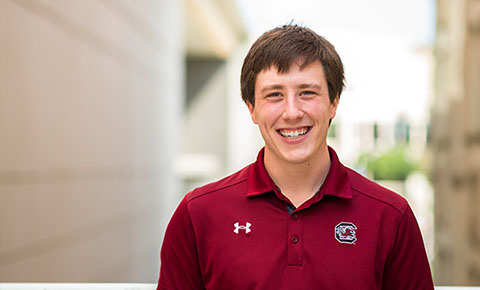Connor Bain Earns First Joint CS + LS Doctoral Degree

Connor Bain (PhD21), whose love for teaching may be rivaled only by his passion for computers, has earned the nation’s first joint doctoral degree in computer science and learning sciences (CS + LS) at Northwestern University’s School of Education and Social Policy.
Bain successfully defended his dissertation, “Empowering Teachers to CT-ify the Science Classroom: Moving from Educational Technology to Computational Thinking,” which explores how computational thinking, or framing problems in a way that computers can help us solve them, might be integrated into existing high school STEM classrooms. The dissertation showed that high school STEM teachers, with some help, could integrate CT into their classrooms, simultaneously engaging students in STEM content and deep computational experiences.
“The power of computing lies in the ability to apply it to something,” Bain said. “Computing doesn’t exist in its own bubble.”
Bain, who immediately stepped into his new role at Northwestern as assistant professor of instruction in the McCormick School of Engineering, wants to bring computation to the masses. It shouldn’t be just a tool reserved for the few, he says. Rather, “it’s a way of empowering people to challenge the world around them. We need the need the next-generation of learners to be computationally literate–to know where and how to use computing to reshape our world.”
As a research assistant at the Center for Connected Learning and Computer-based Modeling for the last six years, Bain has been a crucial member of the CT-STEM project, which helps high school teachers incorporate computational thinking into their curricula, including subjects like biology, statistics, and environmental science. A true partnership, the content is co-designed by teachers and Northwestern researchers and tested in classrooms.
Bain also develops and maintain the Models Library for the popular Agent-based modeling language NetLogo, which is used by tens of thousands of students, educators, and scientists each year.
"Connor is an extraordinarily good teacher of technologies and computers; probably the best I’ve ever seen,” said his advisor, Uri Wilensky, the Lorraine H. Morton professor of Learning Sciences, Computer Science and Complex Systems at Northwestern. “His sees teachers as the lynchpins of the reform and transformation process. Instead of just making new tech and giving it to students, he wants teachers to be a central part of the process so they get he same training as students.”
Bain studied the obstacles teachers face in trying to bring computational thinking to the classroom and came up with a list of effective tools and processes to help them manage, Wilensky said. “He also co-designed intelligent badges, was the Czar of the NetLogo models library – he did all kinds of thing on the side, without anyone asking him,” Wilensky said.
Pioneering Dual Degree Program
The CS + LS program is designed for students like Bain, who don’t want to choose between the fields of computer science and learning sciences. Instead, it emphasizes the growing connections between research on learning and computation.
The program builds on the nation’s first learning sciences PhD program, developed at the School of Education and Social Policy in 1991, and draws from the diverse expertise of affiliated faculty from SESP and the McCormick School of Engineering.
Bain was originally drawn to the learning science program when he discovered that several faculty members held professorships in both the School of Education and Social Policy and the McCormick School of Engineering. The group now includes Wilensky, Michael Horn, Matthew Easterday, Eleanor O’Rourke, and Marcelo Worsley.
Originally from South Carolina, Bain’s family lineage is rich with professors, PhDs, and musicians. Interdisciplinary thinking, he said, was a natural part of his upbringing.
His father, Northwestern alumnus Reginald Bain (BSM86, 91) is professor in the School of Music at the University of South Carolina, with a specialty in computer music. Bain’s mother, Erin Keefe Bain, also a Northwestern alumna (SoC87), is a liturgical pianist and organist.
Bain, the second of four boys, minored in music as an undergrad at the University of South Carolina, and is a classical percussionist. “Growing up, I knew that computers could be applied to anything,” he said. “And I was constantly in a teaching atmosphere, so that’s what I gravitated towards.”
Bain spent his first few years as a learning sciences student and later transferred into the CS + LS program in the winter of 2017 as one of its first three students. In the fall of 2021, three new students joined, pushing the total to 15.
“Computer science is a tool in both education and science classrooms,” he said. “You can apply it to whatever you’re interested in and that was the intersection I was looking for.”
As a doctoral student, Bain was the discussion section leader and guest lecturer for an undergraduate core course in SESP, Introduction to Statistics and Research Methodology, where he suspected he was having more fun that his students – who often didn’t consider themselves “math people.”
But Bain de-emphasized calculation, instead stressing the basic ideas and concepts of statistics to help students develop a feel for probabilities and sampling distribution results, without immediately diving into extensive calculations.
The approach worked so well that SESP Professor Jeannette Colyvas, former director of undergraduate programs, asked him to develop and teach a sequel to the intro class. The result was “Statistical Causal Inference” which he taught in 2020.
Still, while Bain enjoys working with students himself, he is a staunch advocate for teachers and works to ensure that any new computer intervention comes with support. And he is thoughtful about broadening participation in the field, which requires more than simply recruiting new students.
“It also requires us to question and reimagine the ways we teach computation– to connect it to students’ lives, rather than casting it as something that ‘other people’ do,” he says.